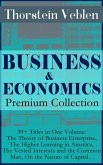In Thorstein Veblen's 'The Theory of Business Enterprise,' the author explores the role of business in modern society, delving into the complex dynamics of production, ownership, and profit. Written in a clear and analytical style, Veblen discusses the impact of business practices on the economy and society, critiquing the capitalist system and highlighting the influence of business on social norms and values. Veblen's work is considered a classic in economic literature, providing readers with a deeper understanding of the inner workings of the business world and its broader societal implications. The book is a significant contribution to the field of economics and remains relevant in today's business landscape. Thorstein Veblen, a prominent economist and social critic, draws on his background in academia and his observations of industrial capitalism to offer insightful perspectives on business enterprise. His keen insights and critical analysis make 'The Theory of Business Enterprise' a must-read for anyone interested in the intersection of economics, business, and society. I highly recommend this book to readers looking to gain a comprehensive understanding of the complexities of the modern business world.
Dieser Download kann aus rechtlichen Gründen nur mit Rechnungsadresse in A, B, BG, CY, CZ, D, DK, EW, E, FIN, F, GR, H, IRL, I, LT, L, LR, M, NL, PL, P, R, S, SLO, SK ausgeliefert werden.









